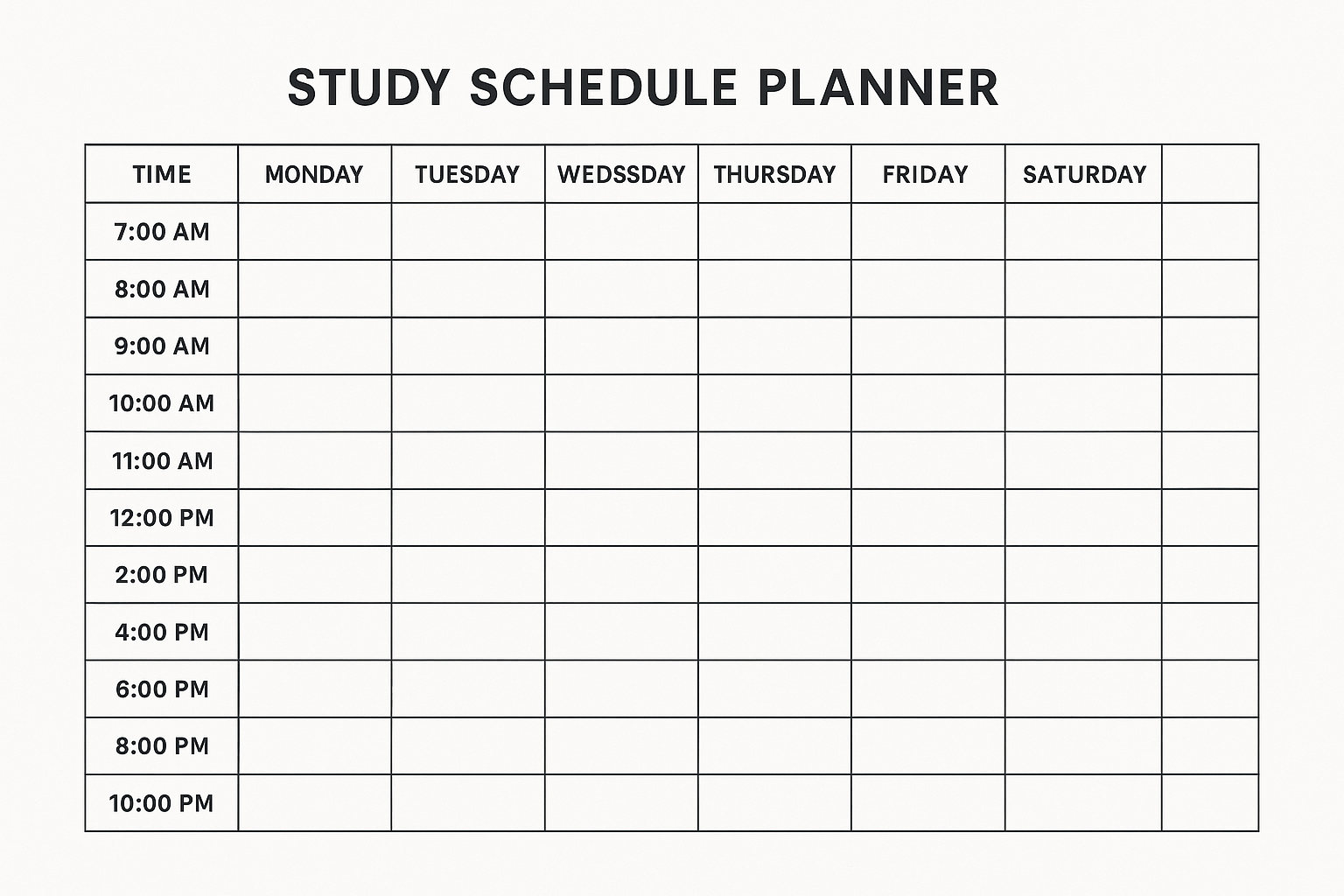University life can get hectic. Between trying to do well in school, finishing all your assignments, hanging out with friends, and participating in extracurricular activities, there is so much going on at once.
The best way to stay organized, prioritize, and de-stress is to create a study schedule. Planning out your time for studying is not only beneficial for your academic performance but also gives you more time for all your other activities.
So, how do you make a study schedule that actually works for you? We have a detailed guide on how to create the perfect study schedule. Keep reading and start planning today!

Why You Should Create a Study Schedule
Before we jump into making a study schedule, it’s important to first highlight the importance of having one. Here are some of the reasons why a study schedule should be non-negotiable for all university students.
1. Time Management
The most important aspect of a great study schedule is that it makes time management possible. University students are often overbooked with everything from classes and extracurricular activities to social lives. Study schedules are a way of allocating the proper time to all the things you need to do.
2. Minimize Stress
By planning your time in advance, you can set up a more realistic study schedule that you are not always trying to cram or overextend. You will feel more in control of your time and your studies, which will result in much less stress.
3. Increase Focus and Productivity
Due to all the activities that need to be done, university students can easily become distracted and disorganized. A study schedule will keep you focused, knowing exactly what you’re doing and when. When your time is properly allocated for certain tasks, you are less likely to procrastinate.
4. Academic Performance
The best time to study is when you have the time available to do so. A study schedule helps you recognize the time that works best for your study sessions. In turn, this makes it easier to retain information, leading to better academic performance.
Steps for Creating a Study Schedule
Making a study schedule is a simple process. It just takes a little bit of planning and work to create the perfect study schedule for you. Follow this step-by-step guide on how to make a study schedule for university students and start planning today.
1. Know Your Commitments
The first step is to understand all of your existing commitments. This includes:
-
Classes – Write down all your classes, their days and times, and their duration.
-
Assignments – What are your current assignments, and what are their deadlines? Write down how much time you think each assignment or task will take.
-
Social activities – It’s not all school and studying. Remember to also note social events, extracurriculars, and work schedules.
-
Personal commitments – Make sure to factor in time for meals, sleep, self-care, and other personal needs into your day.
Knowing all your current commitments will allow you to see your free time for study.
Related: Last Minute Exam Preparation Tips
2. Set Your Goals
The next step is setting your study goals. Having clear goals for your study sessions will help you stay on course and remain motivated to study.
Some examples of study goals include:
-
Finish a set number of pages from a book.
-
Complete practice questions or a practice test.
-
Complete or revise an assignment.
-
Review lecture notes to reinforce what was taught.
It is important that your goals are clear and well-defined. For example, a goal like “study for a test” should be broken down into smaller goals, such as “review chapters 2 and 3.”
Related: 9 Last Minute Exam Cramming Tips That Work
3. Prioritize Tasks
After setting your goals, you will need to prioritize them. Some tasks are more important than others, and it is important to identify which are the most urgent or critical.
Factors to consider when prioritizing tasks include:
-
Urgency: This refers to how soon a task is due. Is it due today, this week, or next week?
-
Importance: Is this task important for your overall grade or knowledge? Will missing this task affect your understanding of other subjects or tasks?
-
Difficulty: Tasks can range from easy to difficult to complete. Some subjects or activities may require more time and effort than others.
Once you have prioritized your tasks, allocate the time for each task according to your study schedule.
Related: 17 Expert Tips on How to Study Smarter Not Harder
4. Allocate Time Slots for Studying
Now, it’s time for you to decide when to study. The secret to a great study schedule is time blocking. Time blocking involves setting a fixed time for each task or activity.
Here’s how to go about it:
-
Know your peak productive hours: Some people are more productive in the morning, while others are more productive at night. Know when you have the most energy and mental focus.
-
Break up your study time: Instead of having two long study sessions, break them up. A good time block should be around 30 minutes to an hour of concentrated focus, followed by a 5- to 10-minute break.
-
Don’t overdo it: Don’t block every free minute of your time. Make sure to leave some space for breaks, meals, and other personal needs. No more than 4–6 hours of study time per day is recommended.
For example, a good time-blocked study schedule might look like this:
-
8:00 AM – 9:00 AM: Review lecture notes from History 101 class.
-
9:00 AM – 9:10 AM: 10-minute break
-
9:10 AM – 10:00 AM: Complete Math assignment
-
10:00 AM – 10:30 AM: Review Chemistry chapters 2 and 3
-
10:30 AM – 11:00 AM: 30-minute break
-
11:00 AM – 12:00 PM: Prepare for upcoming economics quiz.
-
12:00 PM – 1:00 PM: Lunch and rest.
Repeat this as many times as necessary, adjusting as needed.
Related: 10 Essential Study Tips for 7th Grade
5. Be Flexible
Things can and will change, and that is perfectly normal. When this happens, it’s best if you just go with the flow and adjust your schedule accordingly. If you miss a study session, don’t punish yourself. Simply shift your schedule around and fit the missed study session during the next available time slot.
Tips for staying flexible:
-
Add buffer time between sessions. You may sometimes take longer than you expected to complete a session.
-
Be willing to adjust when things change. If something comes up or there is a sudden shift in your priorities, just be flexible.
-
Avoid over-scheduling. The temptation to study as much as possible can sometimes be too much to bear. While it’s good to use every bit of your available time, you must also make time for rest and other personal needs.
Related: How To Study Notes Effectively
6. Stay Organized with Tools
Organization is one of the simplest ways to stick to your study schedule. Here are some of the tools that will help you stay organized:
-
Google Calendar: This online calendar is great for creating a study schedule that’s easy to read and allows you to set reminders for each of your study sessions.
-
Trello: Trello is a project management app that will allow you to create and track your to-do lists and deadlines.
-
Forest: Forest is a focus app that keeps you away from your phone during study sessions.
-
My Study Life: My Study Life is a student planner app that helps you manage your study schedule, assignments, and exams.

7. Evaluate and Adjust Your Schedule
Once you’ve finished creating your study schedule, it’s not the end. You need to regularly check your schedule and make adjustments as needed. One way to evaluate if your schedule is working is by regularly checking to see if you’re achieving your goals and whether or not your study time is evenly distributed.
Asking yourself some of these questions will help you determine when you need to adjust your schedule:
-
Are you able to keep your study goals, or are you struggling with some?
-
Are you able to stick to your study time slots, or do you often find yourself procrastinating?
-
Do you feel like you have enough spare time, or are you always short on time?
If any of the above questions are answered negatively, then it may be time to make some adjustments to your study schedule.
Tips for Sticking to Your Study Schedule
Creating a study schedule is the easy part. Sticking to it and being consistent can sometimes be much more difficult. Here are some tips to help you stay consistent and on schedule:
-
Start small: If this is your first time creating a study schedule, don’t bite off more than you can chew. Start with a couple of the most important tasks and work from there.
-
Reward yourself: Give yourself a reward for every study session you complete. It doesn’t have to be anything big or complicated. A snack, a short walk, or even an episode of your favorite show can be a great reward.
-
Stay accountable: Make sure you have someone who will help you stay accountable. It can be a classmate, friend, or even a family member. Tell them about your schedule and have them check on you from time to time.
-
Stay consistent: Consistency is key to everything, and a study schedule is no exception. Try your best to stick to your study schedule as much as possible. You will get more used to it the more you do it.
Conclusion
Planning your study time in advance can be a lifesaver. With a study schedule, you will find that you have a clear direction for your study time and will be more productive than ever. The steps outlined above will help you start planning the perfect study schedule. So go out there and start planning today!
Save pin for later.

- 9 Things Daughters Of Narcissistic Mothers Don’t Do - 02/03/2026
- Daughters of Narcissistic Mothers Healing Affirmations - 27/02/2026
- 5 Perfect Mother’s Day Gift Ideas (That She’ll Truly Love) - 27/02/2026
